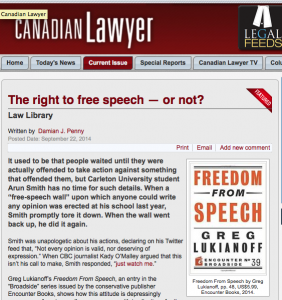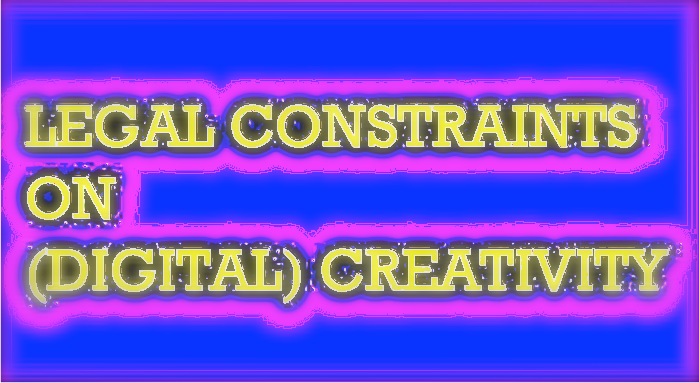
Interesting piece reflecting on whether there is a right to be protected from information that is uncomfortable? What about information that is “offensive”? What about information that is “dangerous”?
Where do you stand on the continuum?
Check out the article here: The right to free speech — or not?.
jon

 Legal Constraints on (Digital) Creativity
Legal Constraints on (Digital) Creativity
I agree with the article when it states that freedom of expression is less culturally and constitutionally sacrosanct in Canada than in the U.S.A. Although I strongly believe in the right to freedom of expression (as it is fundamental for journalism in a democracy) I also believe in limitations to this freedom.
I have been taught and agree that there are limitations to all rights, especially at the point when they begin to infringe on other rights. This applies to freedom of speech when it crosses the line into hate speech territory. Examples where I believe this freedom should be curbed include the Westboro Baptist protests at funerals, and teachers who teach students that the Holocaust did not happen.
However, it is important not to go too far in limiting the right to free speech as the article states. Freedom of speech supersedes a person’s right to be protected from information that makes them uncomfortable or that they disagree with. People should only be protected from information that can be proven to be damaging.
You have certainly described the state of the law accurately for Canada. It is more of a constitutional balancing act and less of an absolute right than in the U.S.
jon
I also believe strongly in free expression but that’s not to say that the purpose of that expression cannot be called into question. As Emily mentioned, hate speech is not an acceptable exercise of one’s freedom of speech. However I am reluctant to say that those individuals do not have the right to voice their disagreeable opinions.
Here is where journalism plays an important role; the responsibility of the journalist is to objectively present the facts so that dissimilar opinions may be debated in an informed and rational way.
Ultimately the right to free speech protects voicing those ideas and opinions that others might find disagreeable. Whether or not another rejects these opinions does not determine whether or not they have the right to be voiced.
Coming back to this reading, I find it particularly troubling that in a university setting, where the sharing and debating of ideas is supposed to be a core tenant of learning, these attitudes towards the censoring of peoples’ opinions are prevalent. A democracy is about engaging with and balancing peoples competing ideologies and the freedom of speech protects this necessary social dialogue.
It would seem that my opinion falls into a more American view of the right to freedom of speech. I believe that people are going to hold dissimilar views whether or not they express them and perhaps in accepting peoples’ right to full expression, an honest discourse may emerge that holds the possibility of swaying peoples’ poorly informed views.
Am right with you Natalie. that is pretty well my view as well.
jon
Interesting case. Worth reading the National Post piece linked to in the Canadian Lawyer article – it’s a perfect example of the inherent subjectivity involved in “defining” free speech. The varying definitions of what is, can, and should be considered free speech is endless – reading through the NP article felt like an assault on my mind in showing the range of understandings of free speech.
Initially, I thought that the free speech wall was a bad idea because it is a perfect vehicle to pseudo-anonymously post hate-driven viewpoints and bully people without consequence. But, that already happens all the time on Facebook, Twitter, Reddit, and every blog and gossip site in existence. Not to mention that old-fashioned thing called face-to-face conversation on the street, in the bar, on the bus. The students were attempting to create a place of expression as part of students’ daily life, utilizing public space and engaging its participants, which I think is necessary in a so-called democratic society. And definitely on a university campus where the exchange of ideas is supposed to be a core pillar of its mandate.
Can we learn, grow, and change if we are not exposed to what we find “uncomfortable, dangerous, and offensive”? My opinion is unequivocally no. That said, I worry about the power of freedom of speech to cause harm to people, harm that cannot be undone or fixed. An extreme example, but not unfathomable: If a student had written a message on the wall that said “Women who abort their babies deserve the death sentence”, which was read by a woman who had an abortion and the student was considering committing suicide, and then they did so, what happens then? Who is responsible?
I don’t like the idea of giving thoughtless argument, irrationality, and hate the power to injure people, physically and/or emotionally. However, I suppose most opinion isn’t really founded on rationality, but rather emotion and subjective personal values and principles. What is cruel to me might not be cruel to another.